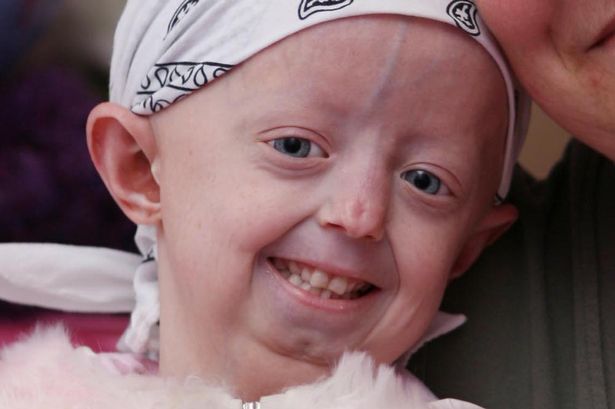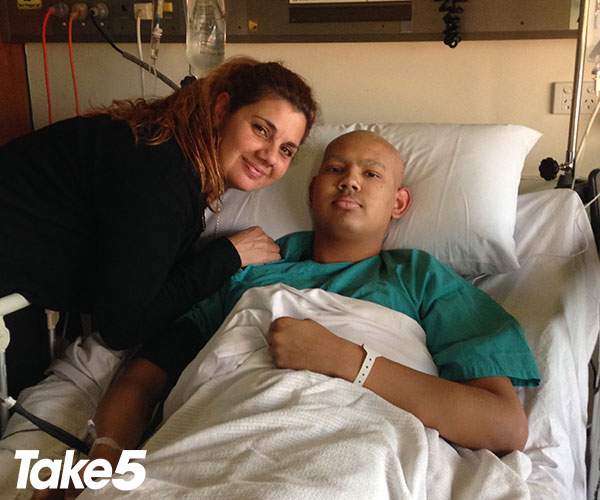Claudia Amaral, 20 shares her brave story:
I looked around the classroom at the other children and knew I looked different.
For a start, they all had hair! Some girls wore their locks loose; others put it up in a ponytail using a pretty bobble.
Me? I wore a brightly coloured cap to cover my bald scalp.
My strange appearance made me stand out at school.
I was shorter than my classmates, too, with a smaller build.
I didn’t feel sorry for myself though. I had a great group of friends and no-one ever made me feel as if I didn’t fit in.

Me as a baby before the symptoms started to appear.
(Image exclusive to Take 5)My parents, Cristina and Jose, had made sure of that.
They never treated me differently to my older brother, also called Jose.
When I turned 10, Mum decided I was old enough to hear the truth about my condition – why I needed extra doctors’ visits, medication, and sometimes woke up in pain.
“When you were born, you were perfect,” Mum told me.
She’d had an easy pregnancy; tests hadn’t picked up any problems. I came into the world with a mop of dark curls.
“Just like me,” Mum said, smiling.
But at four months old, my hair began to fall out.
My skin became wrinkly and pigmented, and although I’d guzzle milk, I was losing weight.
“I knew something was wrong even before the doctors did,” Mum said.
Typical mother’s instinct.
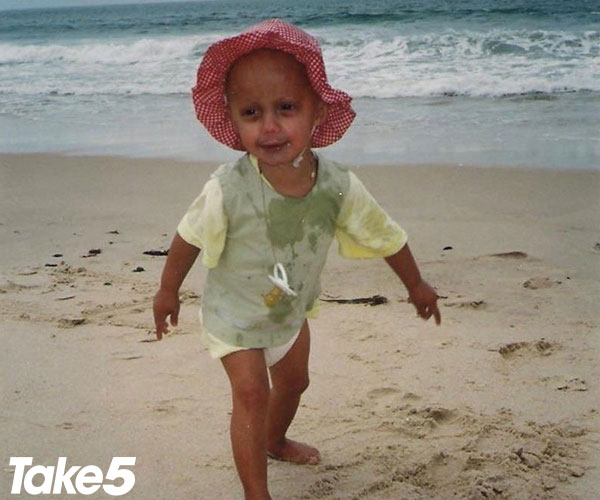
As a toddler – Mum and Dad kept life normal for me.
(Image exclusive to Take 5)Finally, when I was one, a specialist told them I had progeria.
It’s a very rare genetic condition causing premature ageing – seven times faster than usual.
It was such a shock for Mum and Dad.
The doctors told them my symptoms would only get worse.
I’d quickly start to suffer from issues associated with age, like heart problems and bone degeneration.
I wasn’t expected to live much beyond my 13th birthday.
“I was scared,” Mum admitted – but it made her and Dad love me more fiercely.
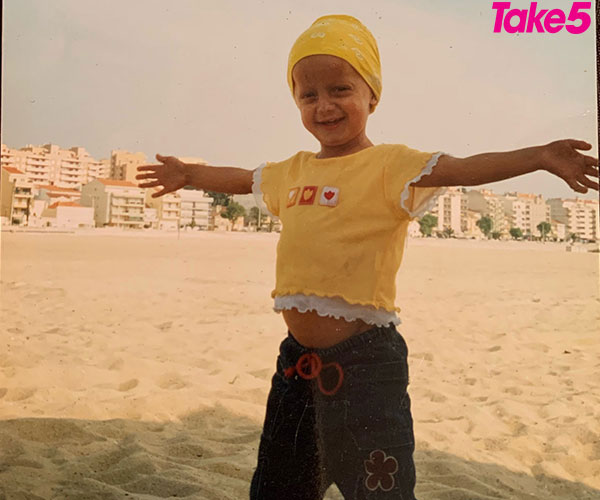
Me in my early teens.
(Image exclusive to Take 5)They researched as much as they could about my condition, but vowed I’d live as normal a life as possible.
And, so far, I had.
Despite my symptoms, I’d made friends at school.
My parents asked teachers not to give me special treatment and I’d never been bullied.
The other kids were kind and always included me in activities, playground games and birthday parties.
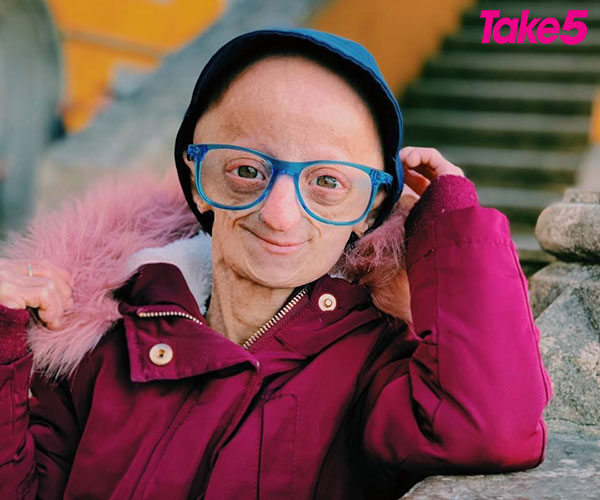
I’ll still pursue my goals and dreams.
(Image exclusive to Take 5)I actually had more trouble with adults. They’d stare or mutter under their breath.
Some even asked my parents if I was a doll.
My big brother was always first to defend me.
“Just leave her alone,” he’d bark at them.
I always felt surrounded by love.
As I got older, though, my bones grew weaker.
I flew to the US to have specialist treatment and took part in a drug trial to try and slow down my ageing body.
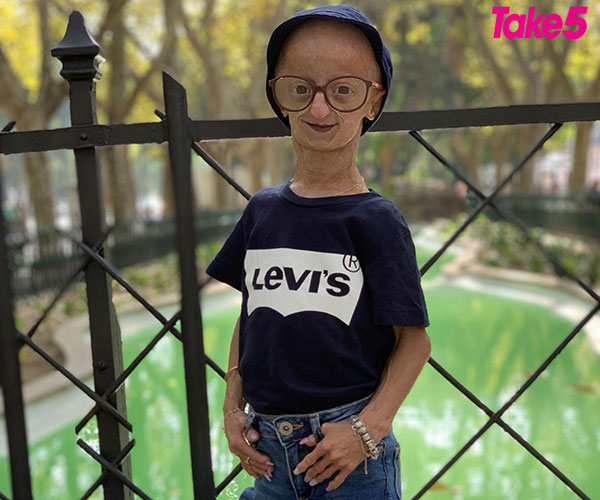
I’m just a young woman living life as best I can.
(Image exclusive to Take 5)Incredibly, my 13th birthday came and went, and my heart stayed healthy.
I was determined to beat the odds.
But, in my late teens, I started suffering in my hip. As the bone deteriorated, the joint kept dislocating.
It wasn’t painful when it slipped out, but I needed to have an operation to realign it.
Doctors told me to rest afterwards, but I was recovering so well, I went out dancing with friends.
After all that, I deserved to have a little fun!
I’m 20 now. That’s 140 in progeria years.
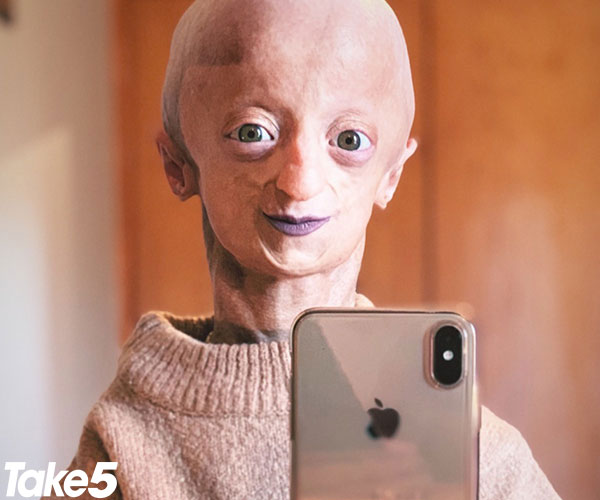
I want to live my life to the fullest while I’m here.
(Image exclusive to Take 5)But when I look in the mirror, I don’t see an old lady.
I just see me, Claudia, the young woman who enjoys going out with her mates and having the odd glass of wine.
I have hopes and dreams like everyone else. I’d love to travel the world one day.
But, mostly, I hope to make my parents proud by refusing to let my condition hold me back.
Just like they’ve always taught me.
It’s not exactly easy, but each day is a battle I’ve won.
Strangers online have called me a ‘warrior’ and a ‘force of nature’, but I’m just living my life to the fullest, because, by rights, I shouldn’t still be here.
While I still am, I won’t waste a single moment.
What is progeria?
● Hutchinson-Gilford progeria syndrome, or progeria, is an extremely rare genetic condition, affecting one in every four million births worldwide.
● It’s caused by a faulty gene, which produces an abnormal protein that triggers rapid ageing. It affects both sexes and the average life expectancy is 13.
● Most children appear healthy when born, but tell-tale signs – including weight loss, large eyes, and a beaked nose – appear in the first year.
